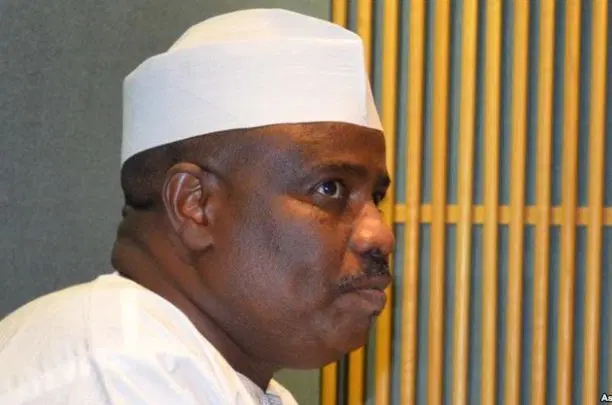

















.webp&w=256&q=75)







Loading banners


NEWS EXPRESS is Nigeria’s leading online newspaper. Published by Africa’s international award-winning journalist, Mr. Isaac Umunna, NEWS EXPRESS is Nigeria’s first truly professional online daily newspaper. It is published from Lagos, Nigeria’s economic and media hub, and has a provision for occasional special print editions. Thanks to our vast network of sources and dedicated team of professional journalists and contributors spread across Nigeria and overseas, NEWS EXPRESS has become synonymous with newsbreaks and exclusive stories from around the world.

A mega power generating company GenCo
Nigeria?s electricity sector was thrown into turmoil yesterday, following yet another collapse of the national grid, plunging most parts of the country into blackout and showing that the persistent instability of the system is yet to be over, despite the unbundling of the transmission segment of the power sector.
This comes amid rising flooding and thunderstorms, which are throwing more homes and industries into darkness as power infrastructure is being submerged.
But while the Nigerian System Operator (NISO), yesterday, said that the development came from a generation company and is being investigated, the Association of Power Generation Companies (GenCos) said over N66 billion or 1,866MW had been lost in the last eight months to load rejections.
The collapse, which occurred at 11:23 a.m., saw grid load plummet dramatically from around 4,500 megawatts (MW) to just 120 MW, according to real-time data from NISO.
With a national installed generation capacity of over 13,000MW, this represents one of the most severe power system disturbances of 2025. The Abuja Electricity Distribution Company (AEDC) confirmed the incident in a notice, informing customers of ?a total loss of supply from the national grid? and assuring that efforts were underway with stakeholders to restore power once stability was achieved.
At the time of the collapse, only four of the country?s 11 electricity distribution companies (DisCos) received allocation. Ibadan Disco had the largest share of 50 MW, followed by Enugu with 40 MW. Abuja was left with just 20 MW while Benin Disco managed 10 MW. Ikeja, Eko, Kano, Kaduna, Jos, Port Harcourt and Yola DisCos received nothing, meaning millions of homes and businesses were without supply.
By 5:00 p.m., significant progress had been made to restore the system. NISO data showed that 1,194 MW had been recovered from 21 plants connected to the national grid. Zungeru led with 175 MW, followed by Azura with 291 MW, Afam with 218 MW, Okpai with 258 MW and Delta with 179 MW.
However, 13 other power plants still reported zero generation, reflecting the scale of the disturbance. A further update at 5:37 p.m. confirmed that total generation had stabilized at 1,055 MW, with power restored to all the 11 DisCos. Abuja, Enugu and Ikeja DisCos each received 150 MW, while Ibadan Disco had 120 MW. Eko was allocated 100 MW, Kaduna 95 MW, Kano 90 MW, Benin 60 MW, Jos and Port Harcourt 50 MW each, and Yola 40 MW. Although this represented a significant improvement from the near-total blackout earlier in the day, supply remained well below national demand.
In a statement, NISO explained that the collapse was triggered by the tripping of a generation company (GenCo), which caused a sharp load drop cascading across other plants.
Meanwhile, The Guardian learnt that the Jambutu substation under Yola Disco was recently submerged during flooding, prompting the company to relocate its power transformers to higher ground.
However, the Transmission Company of Nigeria (TCN) had earlier reported fresh infrastructure damage, revealing that a thunderstorm had snapped the 132 kV Otukpo?Nsukka?New Haven transmission line.
According to TCN Spokesperson Ndidi Mba, the fallen conductor caused a fire that burned a parked car, torched a nearby house, and killed two cows. Officials from TCN?s Enugu Region have since carried out an on-site assessment.
Executive Secretary of the Association of Power Generation Companies (APGC), Joy Ogaji, criticized the recurrent load rejection experienced during the period. Ogaji said these losses further undermine GenCos? ability to invest in maintenance and expansion.
Relatedly, the Nigeria Labour Congress (NLC) has described the total collapse of the national grid as utter disgust, calling for a comprehensive public audit of the entire power sector since privatization failed.
It said that it has become imperative for a fundamental review of the privatization model itself, with a view to reviving the critical sector. NLC President, Joe Ajaero, in a statement yesterday, said that the continued collapse of the national grid was a direct attack on the country?s national productivity.
He added that the recurrent catastrophe was not an accident but the direct and inevitable result of a capitalist ruling class that has deliberately engineered the power sector to fail.
Ajaero said that since the government said it had N4 trillion to invest in the sector, he suggested that the funds be redirected towards a public-led initiative to build new generation capacity and revitalize the transmission infrastructure instead of handing it over to the GenCos and DisCos. (The Guardian)